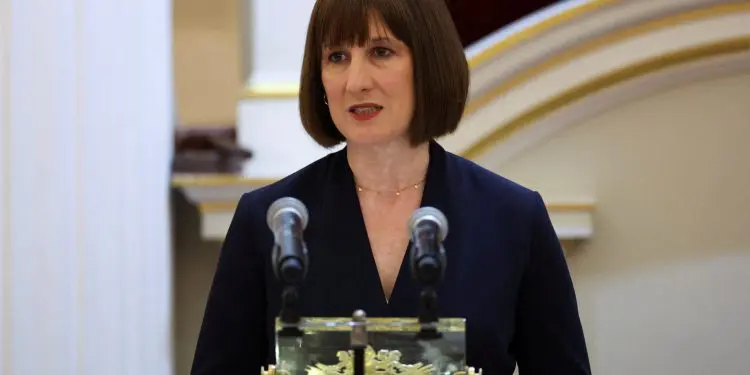As British Chancellor Rachel Reeves jets off to Beijing, her mission to salvage the U.K.’s faltering economy comes with high risks and higher stakes. With the U.S.-China rivalry intensifying and Donald Trump returning to the White House, Reeves’ diplomatic gamble threatens to trigger a political backlash that could reverberate across the Atlantic and beyond.
This carefully timed trip aims to thaw frosty U.K.-China relations, revive economic ties, and secure investments. Yet, the move could provoke the wrath of America’s incoming administration, where Trump’s hardline stance against China dominates the political agenda. Could Reeves’ bid to win Beijing’s favor backfire spectacularly?
China Trip: Economic Lifeline or Political Minefield?
Accompanied by a small delegation of financial heavyweights, including HSBC Chair Mark Tucker and Bank of England Governor Andrew Bailey, Reeves’ trip is designed to be low-key. However, its significance is anything but. The visit marks the first U.K.-China Economic and Financial Dialogue since 2019, a sign of potential reconciliation after years of strained relations under Conservative leadership.
The stakes couldn’t be higher. The U.K.’s economy is teetering, with borrowing costs hitting 1998 levels and the pound in freefall. Reeves is banking on rekindling economic ties with the world’s second-largest economy to stabilize Britain’s finances.
But Trump’s imminent return to power casts a long shadow. Known for his zero-sum worldview, Trump has already hinted at using military and economic force to challenge China. A cozying-up to Beijing could make Britain a target for Trump’s ire, amplified by his megaphone on social media and his influence on U.S. economic policy.
The Risks of a Two-Gorilla World
Britain finds itself precariously sandwiched between two global superpowers. While Reeves’ overtures to China might promise economic rewards, they also risk alienating the U.S., Britain’s largest single trading partner. The City of London’s financial institutions, critical to the U.K.’s economy, are acutely aware of this delicate balancing act.
“China is a growing and important partner, but the U.S. is way more important,” warned a bank lobbyist. “All it will take is Trump to notice, and we’ll face another storm of attacks.”
Even seemingly benign initiatives like green finance—a key focus of the Beijing visit—could provoke backlash from Washington, which favors fossil fuels under Trump’s leadership. Reeves must tread carefully to avoid being painted as soft on China at a time when transatlantic ties are crucial.
Beijing’s Leverage: Britain’s Weak Hand
China, well aware of Britain’s economic desperation, holds the upper hand in these negotiations. Reeves may hope to emulate former Chancellor George Osborne’s strategy of turning London into an offshore hub for Chinese finance, but times have changed. Beijing’s markets remain notoriously difficult to penetrate without political connections, and the U.K.’s leverage is limited.
“Beijing will seek to capitalize on the Trump presidency to drive a wedge between the U.S. and the U.K.,” warned Sophia Gaston of the Australian Strategic Policy Institute. Reeves’ need for quick wins may play straight into China’s hands, potentially undermining the broader Western stance on human rights and security concerns.
The Shadow of Trump
Reeves’ trip not only risks upsetting the U.S. but also invites direct scrutiny from Trump himself. With Elon Musk amplifying Trump’s messaging on platforms like X, the potential for a public backlash is enormous. A single tweet could derail Reeves’ carefully orchestrated visit, creating a firestorm that undermines Britain’s economic and diplomatic credibility.
This isn’t just speculation; Trump’s past behavior suggests he won’t hesitate to lash out. “We’ve got someone who’s incredibly hostile to China coming into the White House,” said a financial expert. The specter of Trump’s reaction looms large over Reeves’ Beijing mission.
Can Reeves Deliver Without Sacrificing Security?
Despite its economic focus, Reeves’ trip cannot entirely sidestep security concerns. U.K. officials, traveling with burner phones to avoid Chinese espionage, remain wary of Beijing’s intentions. The Treasury hopes to secure access for British legal services and agricultural exports, but the overarching goal is to avoid getting caught in the crossfire of U.S.-China tensions.
While Reeves seeks to revive financial ties with Beijing, her government has yet to resolve domestic disputes over how to handle China’s growing influence. Recent scandals, including a spying row involving Prince Andrew and a Chinese businessman, highlight the complexities of navigating this fraught relationship.
Conclusion: A High-Risk Gamble
Reeves’ China visit is a bold move at a critical juncture for Britain. While the economic potential is undeniable, the geopolitical risks are immense. By engaging with Beijing, Reeves hopes to stabilize Britain’s economy and position it as a neutral player between two superpowers. However, this strategy risks angering Trump and alienating key allies in Washington and Brussels.
For Reeves, the success of this trip hinges not only on securing tangible economic gains but also on avoiding a political backlash that could undermine her government’s credibility. The question remains: Can Britain walk the tightrope between Beijing and Washington without falling?







